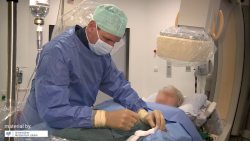The CULPRIT-SHOCK trial: breakthrough findings for the treatment of heart attack patients with cardiogenic shock
Cardiogenic shock complicating acute myocardial infarction (AMI) represents a major European healthcare concern with mortality rates between 40-70%. The clinician is faced with the decision to either intervene only on the culprit lesion acutely responsible for the initiation of cardiogenic shock, or treat additional lesions considered hemodynamically significant but not acutely triggering the shock cascade as well. Current guidelines recommend percutaneous coronary intervention of all critical lesions. However, due to a lack of randomized trials, these recommendations are solely based on registry data and pathophysiological considerations. The aim of the randomized CULPRIT-SHOCK trial has therefore been to compare immediate multivessel PCI (Percutaneous Coronary Intervention) versus culprit lesion only PCI in patients with AMI complicated by cardiogenic shock. For the study, a total of 706 cardiogenic shock patients have been randomized in 11 European countries. CULPRIT-SHOCK clarified the role of different percutaneous revascularization strategies in patients with cardiogenic shock secondary to myocardial infarction and multivessel disease. CULPRIT-SHOCK is now the largest randomized controlled clinical trial in patients with cardiogenic shock ever conducted and will inform patients, healthcare providers, and decision-makers about which percutaneous revascularization strategy is most effective. The CULPRIT-SHOCK project has received funding by the European Union under the 7th Framework Programme. The consortium consists of 18 partners with clinical and scientific knowledge. The project coordinator is Prof. Dr. Thiele (University of Luebeck). The trial started on 1st September 2013 and ended on 31 August 2018. Find out more about the project and its results in the project video: https://www.culprit-shock.eu/dissemination/project-video/(opens in new window) More information about the CULPRIT-SHOCK trial and its results will be available under: https://www.culprit-shock.eu(opens in new window) https://twitter.com/Culprit_Shock(opens in new window)
Keywords
Countries
Austria, Belgium, Switzerland, Germany, France, Italy, Lithuania, Netherlands, Poland, Sweden, Slovenia, United Kingdom



